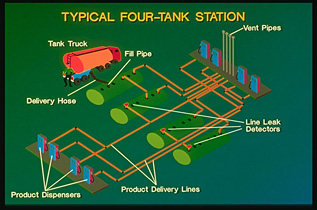Contact Pacific Southwest Waste Program
Pacific Southwest, Region 9
Serving: Arizona, California, Hawaii, Nevada, Pacific Islands, Tribal Nations
Protecting Drinking Water
Colorado River Resort Pays $55,076 Penalty for Underground Storage Tank Law Violations
Larger Image
An ounce of prevention can truly be worth a pound of cure when it comes to owning and operating a gas station. The owner of Lost Lake Resort on the Colorado River recently settled with EPA for a penalty of $55,076 for failure to prevent gasoline leaking into soil and groundwater. The owner had violated federal laws that regulate underground storage tanks (USTs) at the resort’s gas station. Lost Lake Resort is located near Blythe, California.
The facility is also responsible for cleaning up the petroleum release. EPA conducted the enforcement in partnership with the Colorado River Indian Tribes (CRIT), on whose land the resort is located. Enforcement Action News Release
Underground storage tanks are a threat to human health and environment if they leak petroleum into soil and drinking water. Federal laws require UST facilities to take measures that help prevent releases and to detect releases when they happen.
One of the most significant violations observed by EPA inspectors was the facility’s failure to respond to a leak alarm triggered by its release detection equipment. The alarm happened months before the EPA inspection.
Proper operation and maintenance of USTs can help owners and operators avoid costly cleanup work. The exact cause of the release at Lost Lake has not been determined. However, if UST operators promptly respond to leak alarms, they can lower cleanup costs significantly by taking care of the release before it spreads.
EPA data shows that cleanup costs average about $125,000 in cases where contamination has not reached groundwater. If groundwater is affected, costs often exceed $1 million.
EPA provides inspection and enforcement support to its Tribal and State partner agencies. Inspectors work with UST facility owners and operators to help them comply with laws and run their businesses in a way that is protective of the surrounding communities and environment. Ultimately, complying with UST operation laws is in the best interest of facility owners and operators because it can help prevent costly petroleum releases.
What is a Release?
A release occurs when the product stored in the UST system (usually petroleum or diesel) gets out into the surrounding environment. This can happen in a variety of ways, including leaks from UST equipment and gasoline spills during deliveries.

